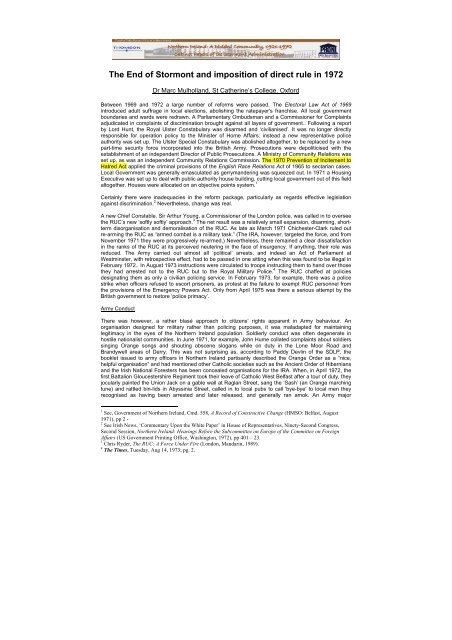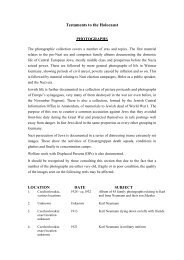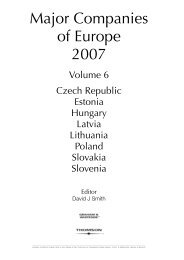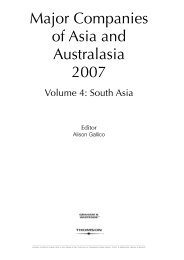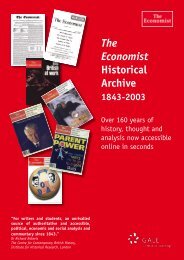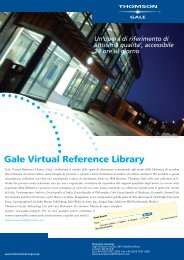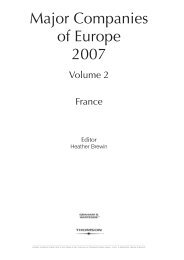The End of Stormont and imposition of direct rule in 1972
The End of Stormont and imposition of direct rule in 1972
The End of Stormont and imposition of direct rule in 1972
Create successful ePaper yourself
Turn your PDF publications into a flip-book with our unique Google optimized e-Paper software.
<strong>The</strong> <strong>End</strong> <strong>of</strong> <strong>Stormont</strong> <strong>and</strong> <strong>imposition</strong> <strong>of</strong> <strong>direct</strong> <strong>rule</strong> <strong>in</strong> <strong>1972</strong><br />
Dr Marc Mulholl<strong>and</strong>, St Cather<strong>in</strong>e’s College, Oxford<br />
Between 1969 <strong>and</strong> <strong>1972</strong> a large number <strong>of</strong> reforms were passed. <strong>The</strong> Electoral Law Act <strong>of</strong> 1969<br />
<strong>in</strong>troduced adult suffrage <strong>in</strong> local elections, abolish<strong>in</strong>g the ratepayer's franchise. All local government<br />
boundaries <strong>and</strong> wards were redrawn. A Parliamentary Ombudsman <strong>and</strong> a Commissioner for Compla<strong>in</strong>ts<br />
adjudicated <strong>in</strong> compla<strong>in</strong>ts <strong>of</strong> discrim<strong>in</strong>ation brought aga<strong>in</strong>st all layers <strong>of</strong> government.. Follow<strong>in</strong>g a report<br />
by Lord Hunt, the Royal Ulster Constabulary was disarmed <strong>and</strong> ‘civilianised’. It was no longer <strong>direct</strong>ly<br />
responsible for operation policy to the M<strong>in</strong>ister <strong>of</strong> Home Affairs: <strong>in</strong>stead a new representative police<br />
authority was set up. <strong>The</strong> Ulster Special Constabulary was abolished altogether, to be replaced by a new<br />
part-time security force <strong>in</strong>corporated <strong>in</strong>to the British Army. Prosecutions were depoliticised with the<br />
establishment <strong>of</strong> an <strong>in</strong>dependent Director <strong>of</strong> Public Prosecutions. A M<strong>in</strong>istry <strong>of</strong> Community Relations was<br />
set up, as was an <strong>in</strong>dependent Community Relations Commission. <strong>The</strong> 1970 Prevention <strong>of</strong> Incitement to<br />
Hatred Act applied the crim<strong>in</strong>al provisions <strong>of</strong> the English Race Relations Act <strong>of</strong> 1965 to sectarian cases.<br />
Local Government was generally emasculated as gerrym<strong>and</strong>er<strong>in</strong>g was squeezed out. In 1971 a Hous<strong>in</strong>g<br />
Executive was set up to deal with public authority house build<strong>in</strong>g, cutt<strong>in</strong>g local government out <strong>of</strong> this field<br />
altogether. Houses were allocated on an objective po<strong>in</strong>ts system. 1<br />
Certa<strong>in</strong>ly there were <strong>in</strong>adequacies <strong>in</strong> the reform package, particularly as regards effective legislation<br />
aga<strong>in</strong>st discrim<strong>in</strong>ation. 2 Nevertheless, change was real.<br />
A new Chief Constable, Sir Arthur Young, a Commissioner <strong>of</strong> the London police, was called <strong>in</strong> to oversee<br />
the RUC’s new ‘s<strong>of</strong>tly s<strong>of</strong>tly’ approach. 3 <strong>The</strong> net result was a relatively small expansion, disarm<strong>in</strong>g, shortterm<br />
disorganisation <strong>and</strong> demoralisation <strong>of</strong> the RUC. As late as March 1971 Chichester-Clark <strong>rule</strong>d out<br />
re-arm<strong>in</strong>g the RUC as “armed combat is a military task.” (<strong>The</strong> IRA, however, targeted the force, <strong>and</strong> from<br />
November 1971 they were progressively re-armed.) Nevertheless, there rema<strong>in</strong>ed a clear dissatisfaction<br />
<strong>in</strong> the ranks <strong>of</strong> the RUC at its perceived neuter<strong>in</strong>g <strong>in</strong> the face <strong>of</strong> <strong>in</strong>surgency. If anyth<strong>in</strong>g, their role was<br />
reduced. <strong>The</strong> Army carried out almost all ‘political’ arrests, <strong>and</strong> <strong>in</strong>deed an Act <strong>of</strong> Parliament at<br />
Westm<strong>in</strong>ster, with retrospective effect, had to be passed <strong>in</strong> one sitt<strong>in</strong>g when this was found to be illegal <strong>in</strong><br />
February <strong>1972</strong>.. In August 1973 <strong>in</strong>structions were circulated to troops <strong>in</strong>struct<strong>in</strong>g them to h<strong>and</strong> over those<br />
they had arrested not to the RUC but to the Royal Military Police. 4 <strong>The</strong> RUC chaffed at policies<br />
designat<strong>in</strong>g them as only a civilian polic<strong>in</strong>g service. In February 1973, for example, there was a police<br />
strike when <strong>of</strong>ficers refused to escort prisoners, as protest at the failure to exempt RUC personnel from<br />
the provisions <strong>of</strong> the Emergency Powers Act. Only from April 1975 was there a serious attempt by the<br />
British government to restore ‘police primacy’.<br />
Army Conduct<br />
<strong>The</strong>re was however, a rather blasé approach to citizens’ rights apparent <strong>in</strong> Army behaviour. An<br />
organisation designed for military rather than polic<strong>in</strong>g purposes, it was maladapted for ma<strong>in</strong>ta<strong>in</strong><strong>in</strong>g<br />
legitimacy <strong>in</strong> the eyes <strong>of</strong> the Northern Irel<strong>and</strong> population. Soldierly conduct was <strong>of</strong>ten degenerate <strong>in</strong><br />
hostile nationalist communities. In June 1971, for example, John Hume collated compla<strong>in</strong>ts about soldiers<br />
s<strong>in</strong>g<strong>in</strong>g Orange songs <strong>and</strong> shout<strong>in</strong>g obscene slogans while on duty <strong>in</strong> the Lone Moor Road <strong>and</strong><br />
Br<strong>and</strong>ywell areas <strong>of</strong> Derry. This was not surpris<strong>in</strong>g as, accord<strong>in</strong>g to Paddy Devl<strong>in</strong> <strong>of</strong> the SDLP, the<br />
booklet issued to army <strong>of</strong>ficers <strong>in</strong> Northern Irel<strong>and</strong> partisanly described the Orange Order as a “nice,<br />
helpful organisation” <strong>and</strong> had mentioned other Catholic societies such as the Ancient Order <strong>of</strong> Hibernians<br />
<strong>and</strong> the Irish National Foresters has been concealed organisations for the IRA. When, <strong>in</strong> April <strong>1972</strong>, the<br />
first Battalion Gloucestershire Regiment took their leave <strong>of</strong> Catholic West Belfast after a tour <strong>of</strong> duty, they<br />
jocularly pa<strong>in</strong>ted the Union Jack on a gable wall at Raglan Street, sang the ‘Sash’ (an Orange march<strong>in</strong>g<br />
tune) <strong>and</strong> rattled b<strong>in</strong>-lids <strong>in</strong> Abyss<strong>in</strong>ia Street, called <strong>in</strong> to local pubs to call 'bye-bye' to local men they<br />
recognised as hav<strong>in</strong>g been arrested <strong>and</strong> later released, <strong>and</strong> generally ran amok. An Army major<br />
1<br />
See, Government <strong>of</strong> Northern Irel<strong>and</strong>, Cmd. 558, A Record <strong>of</strong> Constructive Change (HMSO: Belfast, August<br />
1971), pp 2 -<br />
2<br />
See Irish News, ‘Commentary Upon the White Paper’ <strong>in</strong> House <strong>of</strong> Representatives, N<strong>in</strong>ety-Second Congress,<br />
Second Session, Northern Irel<strong>and</strong>: Hear<strong>in</strong>gs Before the Subcommittee on Europe <strong>of</strong> the Committee on Foreign<br />
Affairs (US Government Pr<strong>in</strong>t<strong>in</strong>g Office, Wash<strong>in</strong>gton, <strong>1972</strong>), pp 401 – 23.<br />
3<br />
Chris Ryder, <strong>The</strong> RUC: A Force Under Fire (London, M<strong>and</strong>ar<strong>in</strong>, 1989).<br />
4 <strong>The</strong> Times, Tuesday, Aug 14, 1973; pg. 2.
defended this as 'lett<strong>in</strong>g <strong>of</strong>f steam', but locals naturally recognised the <strong>in</strong>solence <strong>of</strong> an army <strong>of</strong><br />
occupation.<br />
British statements early <strong>in</strong> the Troubles only served to re<strong>in</strong>force this bellicose image. In July 1971, for<br />
example, the Home Secretary, Reg<strong>in</strong>ald Maudl<strong>in</strong>g bluntly stated that he considered that a state <strong>of</strong> war<br />
existed between the IRA <strong>and</strong> the British Army. Blanket polic<strong>in</strong>g, even if <strong>in</strong> the rough <strong>and</strong> ready Army<br />
guise, was keep<strong>in</strong>g the lid on nationalist riot<strong>in</strong>g, but at the cost <strong>of</strong> generat<strong>in</strong>g huge resentment. Faulkner<br />
caused consternation when, on 25th May 1971, he <strong>in</strong>formed the <strong>Stormont</strong> Parliament that, “At this<br />
moment any soldier see<strong>in</strong>g a person with a weapon or act<strong>in</strong>g suspiciously may fire to warn or with effect<br />
depend<strong>in</strong>g on circumstances without wait<strong>in</strong>g for orders. … This is a strong warn<strong>in</strong>g to the whole<br />
community.” At Westm<strong>in</strong>ster the embarrassed Lord Balniel, M<strong>in</strong>ister <strong>of</strong> State for Defence, clarified the<br />
position. “Troops may open fire when it is judged necessary to do so to save life.” He added that <strong>in</strong> giv<strong>in</strong>g<br />
support to a civil power a soldier should use “no more force than was necessary.” Nevertheless, a new,<br />
ruthless spirit was abroad.<br />
In fact the Army strategy <strong>of</strong> heavy-h<strong>and</strong>ed conta<strong>in</strong>ment was prone to collapse under its own weight. Its<br />
grip had never been as tight <strong>in</strong> Derry as <strong>in</strong> Belfast, <strong>and</strong> on 8 July 1971, the Army shot dead Seamus<br />
Cusack, <strong>of</strong> Creggan, <strong>and</strong> the next morn<strong>in</strong>g George Desmond Beattie. Elaborate cover stories implicat<strong>in</strong>g<br />
the men <strong>in</strong> acts <strong>of</strong> potentially lethal violence were concocted, to local outrage. In fact they were victims <strong>of</strong><br />
the Army strategy <strong>of</strong> treat<strong>in</strong>g riot<strong>in</strong>g as a form <strong>of</strong> low-level paramilitarism. Catholic op<strong>in</strong>ion <strong>in</strong> Derry was<br />
noticeably radicalised. When, on Saturday 24 July, a skidd<strong>in</strong>g army lorry crushed a young boy <strong>in</strong> the<br />
Bogside, members <strong>of</strong> the Derry Citizens' Central Council we forced to protect <strong>in</strong>vestigat<strong>in</strong>g RUC <strong>of</strong>ficers<br />
from an angry crowd. Similar Army heavy-h<strong>and</strong>edness wound tension <strong>in</strong> Belfast beyond break<strong>in</strong>g po<strong>in</strong>t.<br />
On 7th August, 1971, a Catholic civilian was shot dead by a soldier when his van backfired outside<br />
Spr<strong>in</strong>gfield Road RUC station. <strong>The</strong> dead man’s passenger was promptly arrested <strong>and</strong> beaten-up <strong>in</strong> the<br />
station <strong>in</strong> Belfast. Widespread riot<strong>in</strong>g erupted as the news spread <strong>and</strong> troops were attacked <strong>in</strong> the Falls,<br />
Ardoyne, New Barnsley <strong>and</strong> Ballymurphy areas. More than 80 shots were fired at army patrols.<br />
<strong>The</strong> justice system <strong>in</strong> Northern Irel<strong>and</strong> had its own embarrassment when on 23 February, <strong>1972</strong>, appeals<br />
by five people <strong>in</strong>clud<strong>in</strong>g John Hume, <strong>and</strong> Ivan Cooper were successful <strong>in</strong> the High Court <strong>in</strong> Belfast. <strong>The</strong>ir<br />
convictions under the Special Powers Act for rema<strong>in</strong><strong>in</strong>g <strong>in</strong> Assembly after it had been ordered to disperse<br />
were quashed by the judgment <strong>of</strong> Sir Robert Lowry, Mr Justice O'Donnell <strong>and</strong> Mr Justice Gibson. <strong>The</strong>y<br />
<strong>rule</strong>d that the Government <strong>of</strong> Irel<strong>and</strong> Act, the legal basis for <strong>Stormont</strong>, did not permit the government <strong>of</strong><br />
Northern Irel<strong>and</strong> to order the armed forces <strong>of</strong> the Crown to take actions. <strong>The</strong> Army, effectively, had been<br />
deprived <strong>of</strong> police power, mak<strong>in</strong>g most <strong>of</strong> its activities s<strong>in</strong>ce 1969 illegal. With frantic haste a Bill was<br />
<strong>in</strong>troduced at Westm<strong>in</strong>ster to retrospectively legalise the situation. <strong>The</strong> Act was passed by both houses<br />
<strong>and</strong> received Royal Assent with<strong>in</strong> hours <strong>of</strong> the Belfast High Court rul<strong>in</strong>g.<br />
Internment<br />
<strong>The</strong> Provisionals were escalat<strong>in</strong>g their bomb<strong>in</strong>g campaign, <strong>and</strong> late <strong>in</strong> July the Army uncovered the<br />
largest quality <strong>of</strong> gelignite yet discovered, 235 pounds. Faulkner was under enormous pressure to<br />
activate the alternative security ‘panacea’: <strong>in</strong>ternment.<br />
A dry-run was launched on 23 July, when army units <strong>in</strong> conjunction with RUC swooped <strong>in</strong> dawn raids,<br />
dur<strong>in</strong>g which documents were seized <strong>and</strong> 48 people were taken for question<strong>in</strong>g. This action served only<br />
to alert the IRA to the com<strong>in</strong>g security <strong>in</strong>itiative. <strong>The</strong> blow fell on Monday 9 August, 1971. Dawn raids on<br />
houses throughout the prov<strong>in</strong>ce, labelled Operation Demetrius (a Roman deity described by Plutarch,<br />
fitt<strong>in</strong>gly enough, as “<strong>in</strong>temperate, warlike <strong>and</strong> … overbear<strong>in</strong>g”), triggered a deluge <strong>of</strong> violence <strong>in</strong> Catholic<br />
areas on a scale not seen s<strong>in</strong>ce 1969. By 12 August, the death toll had risen to 25, <strong>and</strong> over 7,000<br />
nationalist refugees from Belfast were reported to have arrived <strong>in</strong> army camps <strong>in</strong> the republic.<br />
<strong>The</strong> day after ‘Demetrius’, the British Army triumphantly claimed a major victory <strong>in</strong> their war aga<strong>in</strong>st the<br />
IRA. But they were immediately trumped by a Provo press conference <strong>in</strong> the Whiterock community centre<br />
<strong>in</strong> Belfast, at which a nationalist <strong>Stormont</strong> MP, Paddy Kennedy, <strong>in</strong>troduced Joe Cahill as the leader <strong>of</strong> the<br />
IRA. Cahill <strong>in</strong>sisted that only two members <strong>of</strong> the IRA had been shot <strong>in</strong> the recent fight<strong>in</strong>g. He cannily<br />
presented the IRA as vanguard <strong>of</strong> an undoubtedly sympathetic nationalist Irel<strong>and</strong>, admitt<strong>in</strong>g that supplies<br />
<strong>of</strong> ammunition were runn<strong>in</strong>g low <strong>and</strong> appeal<strong>in</strong>g for military assistance from the Republic. Certa<strong>in</strong>ly this<br />
found an echo at popular level. In a strik<strong>in</strong>g <strong>and</strong> controversial <strong>in</strong>cident on 29 August, two British Army<br />
ferret cars accidentally crossed the border with County Louth <strong>in</strong> the Republic where they were<br />
surrounded by a crowd which set one <strong>of</strong> the cars alight. <strong>The</strong> retreat<strong>in</strong>g soldiers were ambushed as they<br />
crossed back <strong>in</strong>to Northern Irel<strong>and</strong>, <strong>and</strong> one was killed.<br />
Fear<strong>in</strong>g that it was be<strong>in</strong>g outflanked, the SDLP responded by call<strong>in</strong>g for a campaign <strong>of</strong> civil disobedience.<br />
Thirty catholic public <strong>of</strong>ficials <strong>in</strong> Derry, <strong>in</strong>clud<strong>in</strong>g vice-chairman <strong>of</strong> the Derry Development Commission,<br />
<strong>and</strong> chairman <strong>of</strong> the police liaison Committee, resigned their posts a few days later. On 6 August, a<br />
general strike closed down bus<strong>in</strong>esses <strong>in</strong> solidly nationalist areas <strong>of</strong> Northern Irel<strong>and</strong>. Rather belatedly,<br />
<strong>and</strong> shortly before the end <strong>of</strong> his statutory tenure as a non-elected <strong>Stormont</strong> m<strong>in</strong>ister, the m<strong>in</strong>ister <strong>of</strong>
community relations, David Bleakley, announced his resignation from the government on 26 September,<br />
1971 on behalf <strong>of</strong> “moderate” op<strong>in</strong>ion.<br />
Internment rapidly became an even greater propag<strong>and</strong>a debacle for <strong>Stormont</strong> <strong>and</strong> the British when,<br />
with<strong>in</strong> days <strong>of</strong> Demetrius, rumours emerged <strong>of</strong> ill-treatment <strong>of</strong> deta<strong>in</strong>ees <strong>in</strong>clud<strong>in</strong>g mak<strong>in</strong>g them run<br />
barefoot over barbed-wire <strong>and</strong> broken glass. Physical brutality aga<strong>in</strong>st <strong>in</strong>ternees seemed fairly endemic<br />
<strong>and</strong> the Association for Legal justice po<strong>in</strong>ted out <strong>in</strong>stances where <strong>in</strong>ternees transferred to Armagh prison<br />
had been re-<strong>direct</strong>ed to hospital because <strong>of</strong> their physical condition on arrival. Some <strong>in</strong>terrogated<br />
prisoners were doped with amphetam<strong>in</strong>e. After the <strong>in</strong>itial swoop, 12 senior IRA men were subjected to<br />
hood<strong>in</strong>g, cont<strong>in</strong>uous noise, postur<strong>in</strong>g aga<strong>in</strong>st a wall for up to six hours, a diet <strong>of</strong> bread <strong>and</strong> water <strong>and</strong><br />
deprivation <strong>of</strong> sleep. <strong>The</strong> government commissioned Comptom Report, with f<strong>in</strong>e hair-splitt<strong>in</strong>g, found no<br />
evidence <strong>of</strong> brutality but rather <strong>of</strong> “ill-treatment”. Amnesty International disagreed, say<strong>in</strong>g the “ill-treatment<br />
used amounted to brutality”. A further government report, by a team headed by Lord Parker, specifically<br />
exam<strong>in</strong>ed <strong>in</strong>-depth <strong>in</strong>terrogation techniques. It concluded that these were justified <strong>in</strong> exceptional<br />
circumstances. Lord Gard<strong>in</strong>er dissented, however, believ<strong>in</strong>g the methods to be illegal <strong>and</strong> immoral, even<br />
<strong>in</strong> time <strong>of</strong> war. Heath, on 2 March, told Westm<strong>in</strong>ster, as no doubt he had to, that the techniques would no<br />
longer be used. After the Al Quaida attacks on New York <strong>and</strong> Wash<strong>in</strong>gton on 11 Setember 2001, they<br />
seem to have become fairly common practice aga<strong>in</strong> <strong>in</strong> the ‘War aga<strong>in</strong>st terror’.<br />
A basic problem was that prison facilities were <strong>in</strong>adequate <strong>and</strong> utterly overwhelmed. Sixteen convicted<br />
IRA prisoners escaped from Cruml<strong>in</strong> Road prison <strong>in</strong> Belfast on 16 November 1971. Another three, Mart<strong>in</strong><br />
Meehan, Dutch Doherty <strong>and</strong> Hugh McCann, rapidly won cult status when they escaped on 2 December,<br />
<strong>and</strong> three escape tunnels were discovered <strong>in</strong> early January <strong>1972</strong>. A government report that month<br />
declared that ‘the Crum’ could not be made escape-pro<strong>of</strong> <strong>and</strong> had to be replaced. <strong>The</strong> makeshift<br />
Maidstone prison ship, anchored <strong>in</strong> Belfast Lough was still less satisfactory. A horror for its <strong>in</strong>mates, it<br />
proved leaky <strong>in</strong> more ways than one. On 17 January <strong>1972</strong> seven <strong>in</strong>ternees swam ashore <strong>and</strong> made good<br />
their escape.<br />
Creation <strong>of</strong> Prison Camps<br />
<strong>The</strong> only possible improvised solution was POW style camps. On 19 September, 1971, Wessex<br />
helicopters ferried the 219 <strong>in</strong>ternees to a specially built <strong>in</strong>ternment camp at Long Kesh, near Lisburn.<br />
Only perimeter security was ma<strong>in</strong>ta<strong>in</strong>ed <strong>and</strong> prisoners were marshalled by their own IRA comm<strong>and</strong>ers.<br />
When it was considered necessary to <strong>in</strong>trude <strong>in</strong>to the ‘cages’, as prisoner compounds were known, this<br />
was carried out by Army raids, which easily escalated <strong>in</strong>to full-blown riots, as on 26th October 1971 when<br />
tear gas was used on the <strong>in</strong>mates. Conditions <strong>in</strong> the camps rema<strong>in</strong>ed dire throughout. In September<br />
1974, Peter McLachlan, a moderate unionist politician, described the conditions <strong>in</strong> Long Kesh as<br />
“<strong>in</strong>tolerable”. In that year, prisoner protests over conditions escalated <strong>in</strong>to a huge riot. Convicted<br />
republican prisoners burnt down a major part <strong>of</strong> the camp, sett<strong>in</strong>g alight at least 11 huts. Troops<br />
swamped the camp, <strong>and</strong> dogs were let loose on the <strong>in</strong>ternees (a number <strong>of</strong> the unfortunate animals were<br />
burnt alive <strong>in</strong> the huts). Helicopters sprayed CS gas from above.<br />
Internment was only ended <strong>in</strong> December 1975 because, as Merlyn Rees, Secretary <strong>of</strong> State at the<br />
time, expla<strong>in</strong>ed, “ it was a real <strong>and</strong> cont<strong>in</strong>u<strong>in</strong>g cause <strong>of</strong> discontent”.<br />
Internment has <strong>of</strong>ten been laid at the door <strong>of</strong> Brian Faulkner, but clearly the decision was not his to take<br />
alone. Reg<strong>in</strong>ald Maudl<strong>in</strong>g, the Home Secretary, was c<strong>and</strong>id enough to say later that the “decision on<br />
whether to lock them up without trial was formally <strong>in</strong> the h<strong>and</strong>s <strong>of</strong> the Northern Irel<strong>and</strong> Government, <strong>and</strong>,<br />
<strong>of</strong> course, <strong>in</strong> particular, Mr Faulkner, but there was an underst<strong>and</strong><strong>in</strong>g between us that it would not be<br />
exercised without the agreement <strong>of</strong> the British Government, for the simple reason that it would be the<br />
British Government <strong>and</strong>, above all, the British Army who would have to carry the can for whatever<br />
happened.” 5<br />
Bloody Sunday<br />
A ban on marches was to have a calamitous impact on the government’s steadily deteriorat<strong>in</strong>g relations<br />
with the catholic community. Civil Right marches had clashed with <strong>in</strong>creas<strong>in</strong>g <strong>in</strong>tensity with the Army at<br />
Armagh, Magilligan Str<strong>and</strong> near Derry (where a new <strong>in</strong>ternment camp was be<strong>in</strong>g constructed) <strong>and</strong><br />
Dungannon. Possibly to sell the ban on march<strong>in</strong>g to Unionist op<strong>in</strong>ion, which was primarily <strong>direct</strong>ed<br />
aga<strong>in</strong>st coat-trail<strong>in</strong>g Orange processions, the Army was crack<strong>in</strong>g down with all vigour on Catholic<br />
marchers. On 30 January, 13 men were shot dead <strong>in</strong> Derry by British troops follow<strong>in</strong>g the violence at the<br />
fr<strong>in</strong>ges <strong>of</strong> a 20,000 strong procession. A wounded victim later died. All were unarmed civilians. Bloody<br />
Sunday, as it was immediately labelled, sparked riot<strong>in</strong>g across nationalist Ulster. Bernadette Devl<strong>in</strong><br />
physically assaulted Reg<strong>in</strong>ald Maudl<strong>in</strong>g <strong>in</strong> the House <strong>of</strong> Commons. He condescend<strong>in</strong>gly observed, with<br />
chilly sang froid, that he was well used to hav<strong>in</strong>g his hair pulled by his children. Faulkner more<br />
appropriately spoke <strong>of</strong> “mount<strong>in</strong>g hysteria” on all sides, <strong>and</strong> called for calm. More than ever, outrage<br />
5 Reg<strong>in</strong>ald Maudl<strong>in</strong>g, Memoirs (Sidgewick <strong>and</strong> Jackson, 1978) 184.
spilled over the border. On 2 February, the day <strong>of</strong> the funerals, five Irish m<strong>in</strong>isters jo<strong>in</strong>ed 20,000<br />
mourners <strong>in</strong> Derry while nationalist Irel<strong>and</strong> shut down <strong>in</strong> a socially <strong>in</strong>clusive general strike. In Dubl<strong>in</strong> a<br />
crowd <strong>of</strong> 1000 provided cover for the IRA to set alight the British Embassy.<br />
A scheduled Civil Rights March (aga<strong>in</strong> illegal) <strong>in</strong> the nationalist border town <strong>of</strong> Newry on Sunday 6<br />
February was expected to prove a flashpo<strong>in</strong>t <strong>and</strong>, with Bill Craig <strong>in</strong>tent on a counter-demonstration,<br />
perhaps the start <strong>of</strong> civil war. Field hospitals were readied <strong>in</strong> the Republic near the border <strong>and</strong> Northern<br />
Irel<strong>and</strong> hospitals were placed on red alert. <strong>The</strong> Roman Catholic Church, however, applied pressure on<br />
the organisers to exercise restra<strong>in</strong>t, <strong>and</strong> they agreed to ask sympathisers not to travel from the Republic.<br />
<strong>The</strong> 20,000 or so demonstrators avoided the town centre <strong>and</strong> collision with the Army. In fact, this marked<br />
someth<strong>in</strong>g <strong>of</strong> an end to nationalist mass demonstrations <strong>in</strong> the North. <strong>The</strong> IRA was now mak<strong>in</strong>g the<br />
runn<strong>in</strong>g <strong>in</strong> Catholic areas, <strong>and</strong> they were on a war-foot<strong>in</strong>g. In the South, freer from Army observation,<br />
open IRA demonstrations were possible for a period. One such, on 13 February <strong>1972</strong>, was held <strong>in</strong> Dubl<strong>in</strong><br />
outside the historic shr<strong>in</strong>e <strong>of</strong> the GPO build<strong>in</strong>g, site <strong>of</strong> the 1916 rebellion. It featured escaped IRA<br />
volunteers on the run <strong>and</strong> attracted some 15,000 people.<br />
British reluctance to impose Direct Rule<br />
We have seen that the <strong>in</strong>itial response <strong>of</strong> the British Government to the Northern Irel<strong>and</strong> Troubles was to<br />
pressurise the Unionist devolved government <strong>in</strong>to reform <strong>in</strong> the hope that <strong>Stormont</strong> would aga<strong>in</strong> become<br />
an acceptable political forum for Catholics. Indeed the first <strong>of</strong>fer <strong>of</strong> substantive constitutional change, it<br />
seems, came from Brian Faulkner as Prime M<strong>in</strong>ister rather than the British Government. On 22nd June,<br />
1971 Faulkner, <strong>in</strong> a major speech dur<strong>in</strong>g the debate <strong>in</strong> reply to the Queen's Speech at <strong>Stormont</strong>, outl<strong>in</strong>ed<br />
new proposals for participation by members <strong>of</strong> the parliamentary opposition <strong>in</strong> the chairmanship <strong>of</strong><br />
parliamentary committees which are to be set up before the end <strong>of</strong> 1971. This, as we have seen, was<br />
scuppered by the SDLP’s withdraw<strong>in</strong>g from <strong>Stormont</strong>.<br />
After the <strong>in</strong>troduction <strong>of</strong> <strong>in</strong>ternment, <strong>and</strong> the consequent escalation <strong>in</strong> violence <strong>and</strong> <strong>in</strong>surgency, Reg<strong>in</strong>ald<br />
Maudl<strong>in</strong>g, the British Home Secretary, concluded that ‘real’ Catholic dem<strong>and</strong>s had moved on:<br />
What I was aim<strong>in</strong>g at was some means <strong>of</strong> provid<strong>in</strong>g the Catholic community with what had really<br />
become their objective, <strong>and</strong> a perfectly legitimate objective, which was no longer merely the<br />
avoidance <strong>of</strong> discrim<strong>in</strong>ation aga<strong>in</strong>st them but a guarantee <strong>of</strong> an appropriate place <strong>in</strong> the<br />
govern<strong>in</strong>g <strong>of</strong> their own country. I was able to agree with Brian Faulkner a form <strong>of</strong> words to<br />
describe what we were seek<strong>in</strong>g to establish. <strong>The</strong> formula was a ‘Permanent <strong>and</strong> guaranteed role<br />
for the m<strong>in</strong>ority community as well as the majority <strong>in</strong> the life <strong>and</strong> public affairs <strong>of</strong> the Prov<strong>in</strong>ce’.<br />
<strong>The</strong> words were admirable. <strong>The</strong> problem was to <strong>in</strong>terpret them <strong>and</strong> make them effective <strong>in</strong><br />
practical terms. 6<br />
Brita<strong>in</strong>’s unwill<strong>in</strong>gness to replace the Unionist controlled devolved government at <strong>Stormont</strong> with Direct<br />
Rule is usually put down to a an amorphous desire to avoid be<strong>in</strong>g sucked <strong>in</strong>to the “Irish bog”. This<br />
phrase, taken from the account written by Labour’s Home Secretary to 1970, James Callaghan, 7 is used<br />
<strong>in</strong> the context <strong>of</strong> a discussion <strong>of</strong> the problems to be confronted <strong>in</strong> deploy<strong>in</strong>g British troops on the streets<br />
<strong>of</strong> Belfast. <strong>The</strong>re was a much more specific reason why Brita<strong>in</strong> was unwill<strong>in</strong>g to impose Direct Rule. This<br />
was the fear <strong>of</strong> an effective unionist revolt. As Callaghan wrote:<br />
We had no idea what the attitude <strong>of</strong> the RUC would be if such a drastic step became necessary,<br />
nor did we know with certa<strong>in</strong>ty whether we could expect loyal services <strong>of</strong> the Northern Irel<strong>and</strong><br />
civil servants … might both majority <strong>and</strong> m<strong>in</strong>ority communities turn on the British Army? 8<br />
<strong>The</strong>re was no l<strong>of</strong>ty disregard for the ‘men <strong>of</strong> violence’, rather an <strong>in</strong>tense regard for the loyalist threat <strong>in</strong><br />
particular, most especially as it was unrealised. Chichester-Clark, the Unionist Prime M<strong>in</strong>ister at<br />
<strong>Stormont</strong>, was aware <strong>of</strong> this British fear <strong>and</strong> played on it <strong>in</strong> an attempt to restrict Westm<strong>in</strong>ster’s authority<br />
to oversight <strong>of</strong> ‘law <strong>and</strong> order’ as adm<strong>in</strong>istered by the Army. Follow<strong>in</strong>g Bloody Sunday, there was<br />
<strong>in</strong>creas<strong>in</strong>g attention paid <strong>in</strong> British Government circles to “cont<strong>in</strong>gency plann<strong>in</strong>g”: “That famous <strong>and</strong> <strong>of</strong>ten<br />
dangerous phrase, ‘someth<strong>in</strong>g must be done’,” William Whitelaw ruefully recalled, “became the <strong>in</strong>evitable<br />
comment <strong>of</strong> the moment.” 9<br />
Suspension <strong>of</strong> the <strong>Stormont</strong> parliament, March <strong>1972</strong><br />
<strong>The</strong> national <strong>and</strong> <strong>in</strong>ternational concern expressed over Bloody Sunday <strong>and</strong> the widespread feel<strong>in</strong>g that<br />
the result<strong>in</strong>g public <strong>in</strong>quiry exonerat<strong>in</strong>g those responsible had been 'widgered' brought a new urgency to<br />
British government policy on Northern Irel<strong>and</strong>. At the end <strong>of</strong> March <strong>1972</strong> the <strong>Stormont</strong> parliament was<br />
6 Reg<strong>in</strong>ald Maudl<strong>in</strong>g, Memoirs (Sidgewick <strong>and</strong> Jackson, 1978) p 185.<br />
7 Rt. Hon James Callaghan, A House Divided (Coll<strong>in</strong>s, 1973) p 15.<br />
8 Rt. Hon James Callaghan, A House Divided (Coll<strong>in</strong>s, 1973), pp 22 - 3.<br />
9 William Whitelaw, <strong>The</strong> Whitelaw Memoirs (Aurum, London, 1989) p 79.
suspended, when the Northern Irel<strong>and</strong> premier, Brian Faulkner, refused to h<strong>and</strong> over formal control <strong>of</strong><br />
<strong>in</strong>ternal security to Westm<strong>in</strong>ster. 'Direct <strong>rule</strong>' from London was immediately imposed. William Whitelaw<br />
was appo<strong>in</strong>ted ‘Secretary <strong>of</strong> State for Northern Irel<strong>and</strong>’. Jim Prior, who later held this position, described<br />
its rather anomalous content:<br />
As Secretary <strong>of</strong> State for Northern Irel<strong>and</strong> I found myself perform<strong>in</strong>g a dual role, as a Governor-<br />
General represent<strong>in</strong>g the Queen <strong>and</strong> as such the enemy <strong>of</strong> every Republican <strong>in</strong> the Prov<strong>in</strong>ce, but<br />
also as a Secretary <strong>of</strong> State act<strong>in</strong>g like a referee <strong>in</strong> a box<strong>in</strong>g r<strong>in</strong>g whose authority seemed to be<br />
resented equally by both sides. 10<br />
Loyalist opposition with<strong>in</strong> Unionism had <strong>in</strong>itially centred upon the reorganisation <strong>of</strong> local government.<br />
<strong>The</strong>y were generally concerned, however, that Brita<strong>in</strong> was fail<strong>in</strong>g to grapple with the challenge from the<br />
IRA <strong>and</strong> distraught that the RUC was unarmed <strong>and</strong>, thus, apparently helpless. A meet<strong>in</strong>g <strong>of</strong> the West<br />
Ulster Unionist Council, led by Harry West, <strong>in</strong> September 1970 issued a document, Faulkner's Fiddlemen<br />
out <strong>of</strong> Tune, which rejected a central hous<strong>in</strong>g body, <strong>and</strong> call<strong>in</strong>g for the formation <strong>of</strong> an armed<br />
reserve comm<strong>and</strong>ed by the police chief <strong>and</strong> under the authority <strong>of</strong> the M<strong>in</strong>ister <strong>of</strong> Home Affairs to deal<br />
with subversive activities. <strong>The</strong> Reverend Mart<strong>in</strong> Smyth, Gr<strong>and</strong> Master <strong>of</strong> the County Gr<strong>and</strong> Orange Lodge<br />
<strong>of</strong> Belfast, spoke for many when he claimed on 18 November 1970 that confidence <strong>in</strong> the Northern<br />
Irel<strong>and</strong> government was “wear<strong>in</strong>g th<strong>in</strong>” <strong>and</strong> called for “firm adm<strong>in</strong>istration <strong>of</strong> law <strong>and</strong> order equitably<br />
throughout the prov<strong>in</strong>ce.” Days later, the Orange Order <strong>in</strong>tervened even more strongly to condemn the<br />
Unionist Party leadership’s attempts to curb the “the useful work <strong>of</strong> the West Ulster Unionist Council.” For<br />
their part Liberal Unionists were mak<strong>in</strong>g moves to organise <strong>in</strong>dependently on the left <strong>of</strong> the party. In<br />
December 1970 Young Unionists formed a “Clevely Committee” to promote “democratic procedure with<strong>in</strong><br />
the party” <strong>and</strong> to provide “an alternative view with<strong>in</strong> the Young Unionist Movement <strong>and</strong> br<strong>in</strong>g about<br />
reforms from with<strong>in</strong>.”<br />
Chichester-Clark attempted to balance between these conflict<strong>in</strong>g trends with<strong>in</strong> Unionism. On 10 March<br />
1971 the bodies <strong>of</strong> three young soldiers <strong>of</strong> the Royal Highl<strong>and</strong> Fusiliers were found at Whitebrae Road <strong>in</strong><br />
the outskirts <strong>of</strong> Belfast. Though <strong>in</strong> civilian clothes <strong>and</strong> <strong>of</strong>f-duty, they had been coldly executed. Bill Craig<br />
threatened the IRA with an organised body <strong>of</strong> loyalists, “tra<strong>in</strong>ed <strong>and</strong> ready to act at the drop <strong>of</strong> a hat”. On<br />
12 March over 4000 shipyard workers <strong>and</strong> shop stewards marched to Unionist Party headquarters<br />
dem<strong>and</strong><strong>in</strong>g the immediate <strong>in</strong>terment <strong>of</strong> known IRA members, But it was Chichester-Clarke who was the<br />
political victim; caught between loyalist dem<strong>and</strong> for an iron-fist <strong>and</strong> apparent security force pusillanimity,<br />
he resigned so as to “br<strong>in</strong>g home to all concerned the realities <strong>of</strong> the situation.”<br />
Faulkner elected Prime M<strong>in</strong>ister <strong>of</strong> N Irel<strong>and</strong><br />
Brian Faulkner had long been heir apparent. On 23 March he was elected head <strong>of</strong> the Parliamentary<br />
Unionist Party, <strong>and</strong> thus Prime M<strong>in</strong>ister, by 26 votes to four over William Craig. In fact his <strong>in</strong>itial moves<br />
immediately reflected his desire to achieve balance <strong>in</strong> the party. David Bleakley, a stalwart <strong>of</strong> the<br />
Northern Irel<strong>and</strong> Labour Party was brought <strong>in</strong>to government as Community Relations M<strong>in</strong>ister. Harry<br />
West <strong>of</strong> the West Ulster Unionisty Council became M<strong>in</strong>ister <strong>of</strong> Agriculture. He appo<strong>in</strong>ted the moderate<br />
Unionist Basil McIvor as M<strong>in</strong>ister <strong>of</strong> Community Relations, but characteristically balanced this by mak<strong>in</strong>g<br />
the hardl<strong>in</strong>e MP for Derry City, Albert Anderson, a Parliamentary Secretary with nom<strong>in</strong>al responsibility for<br />
the “security situation on the ground”. Gerald B Newe, though not an MP, was appo<strong>in</strong>ted M<strong>in</strong>ister <strong>of</strong> State<br />
<strong>in</strong> the Prime M<strong>in</strong>ister’s Office, the first catholic <strong>in</strong> the Cab<strong>in</strong>et. Newe, unfortunately, had the undeserved<br />
reputation <strong>of</strong> be<strong>in</strong>g a tame ‘castle catholic’. However, West’s appo<strong>in</strong>tment led to the resignation from the<br />
party <strong>of</strong> Anne Dickson, the moderate MP for Carrick, <strong>and</strong> even the outgo<strong>in</strong>g M<strong>in</strong>ister for Community<br />
Relations, Dr Robert Simpson, condemned Faulker for double-deal<strong>in</strong>g. On the right <strong>of</strong> the party, William<br />
Craig presided over a meet<strong>in</strong>g <strong>in</strong> the town <strong>of</strong> Portadown, <strong>in</strong>volv<strong>in</strong>g Unionist representatives from 43 <strong>of</strong> the<br />
52 constituency parties. From this emerged a g<strong>in</strong>ger group known as ‘Vanguard’ bent upon the<br />
restoration <strong>of</strong> <strong>in</strong>ternal security responsibility to the Ulster government. On 26 January <strong>1972</strong>, <strong>in</strong> a speech<br />
at Londonderry to the Loyalist Association <strong>of</strong> Workers, Craig, announced his <strong>in</strong>tention to organise rallies<br />
<strong>in</strong> every major centre <strong>of</strong> the prov<strong>in</strong>ce culm<strong>in</strong>at<strong>in</strong>g <strong>in</strong> a massive demonstration <strong>in</strong> Belfast on 18th March.<br />
Faulkner, meanwhile, attempted to construct a new political dispensation. In a major speech on 22 June<br />
1971, dur<strong>in</strong>g the debate <strong>in</strong> reply to the Queen’s Speech at <strong>Stormont</strong>, he outl<strong>in</strong>ed an <strong>of</strong>fer <strong>of</strong> new<br />
proposals for participation by members <strong>of</strong> the opposition <strong>in</strong> the chairmanship <strong>of</strong> parliamentary committees<br />
to be set up before the end <strong>of</strong> 1971. <strong>The</strong>se committees would oversee legislation <strong>and</strong> have privileged<br />
access to civil service <strong>in</strong>formation. It was <strong>in</strong>ch<strong>in</strong>g the opposition <strong>in</strong>to the antechamber <strong>of</strong> the executive.<br />
Paddy Devl<strong>in</strong> <strong>of</strong> the SDLP hailed revolutionary change <strong>and</strong> Brian Faulkner’s ‘best hour’. On 7th July the<br />
first ever <strong>in</strong>ter-party meet<strong>in</strong>g was held at <strong>Stormont</strong>, with representatives <strong>of</strong> the Ulster Unionists, SDLP,<br />
Nationalist Party <strong>and</strong> the NILP <strong>in</strong> attendance.<br />
10 Jim Prior, A Balance <strong>of</strong> Power (Hamish Hamilton: London, 1986) p 181.
All seemed set fair, but on the night <strong>of</strong> 8 July, the Army <strong>in</strong> Derry shot dead Seamus Cusack <strong>of</strong> Creggan,<br />
<strong>and</strong> the next morn<strong>in</strong>g George Desmond Beattie. Elaborate cover stories implicat<strong>in</strong>g the men <strong>in</strong> acts <strong>of</strong><br />
potentially lethal violence were concocted, to local outrage. In fact they were victims <strong>of</strong> the Army strategy<br />
<strong>of</strong> treat<strong>in</strong>g riot<strong>in</strong>g as a form <strong>of</strong> low-level paramilitarism. On 12 July the SDLP MP for the area, John<br />
Hume, took his own party by surprise when he declared that unless a public <strong>in</strong>quiry was held, the SDLP<br />
would withdraw from <strong>Stormont</strong> <strong>and</strong>, moreover, would set up their own assembly. A public <strong>in</strong>quiry was<br />
refused (by Lord Balniel at Westm<strong>in</strong>ster, as the Army did not come under <strong>Stormont</strong>’s jurisdiction).<br />
Faulkner compla<strong>in</strong>ed that it was irresponsible <strong>of</strong> the SDLP to <strong>in</strong>dulge <strong>in</strong> “<strong>in</strong>stant politics <strong>of</strong> exploit<strong>in</strong>g every<br />
issue as it arises without consideration <strong>of</strong> the long-term effects”, but the party boycotted <strong>Stormont</strong><br />
regardless. All talk <strong>of</strong> political breakthrough was at an end, <strong>and</strong> a slugg<strong>in</strong>g match between the Army <strong>and</strong><br />
IRA seemed <strong>in</strong> prospect.<br />
Launch <strong>of</strong> “Ulster Vanguard”<br />
On 13 February <strong>1972</strong>, Ulster Vanguard, the new movement launched by William Craig, announced itself<br />
at a mass meet<strong>in</strong>g <strong>in</strong> Lisburn. Capta<strong>in</strong> Austen Ardill, former MP for Carrick, denied that Vanguard was a<br />
political party; it was, rather, a movement to br<strong>in</strong>g together all loyalists. Craig, <strong>in</strong> the first <strong>of</strong> a series <strong>of</strong><br />
speeches <strong>of</strong> <strong>in</strong>creas<strong>in</strong>g bellicosity, proclaimed loyalist determ<strong>in</strong>ation to ma<strong>in</strong>ta<strong>in</strong> their British traditions<br />
<strong>and</strong> way <strong>of</strong> life <strong>and</strong> “God help those who get <strong>in</strong> our way, for we mean bus<strong>in</strong>ess”. At a rally <strong>of</strong> some 50,000<br />
<strong>in</strong> Ormeau Park on 18 March, <strong>1972</strong>, William Craig, declared that “we must build up a dossier <strong>of</strong> the men<br />
<strong>and</strong> women who are a menace to this country because if the politicians fail us, it may be our job to<br />
liquidate the enemy”. Ian Paisley held alo<strong>of</strong> from Craig’s <strong>in</strong>itiative, believ<strong>in</strong>g his evident attraction to<br />
negotiated <strong>in</strong>dependence for Northern Irel<strong>and</strong> was “certa<strong>in</strong>ly not acceptable to the vast majority <strong>of</strong> the<br />
loyalist people.” Craig was, to be sure, temperamental, but he was not a lone voice. His Vanguard<br />
tendency, it was claimed <strong>in</strong> January 1973, had the support <strong>of</strong> 60 per cent <strong>of</strong> Ulster Unionists.<br />
Vanguard <strong>of</strong>ten veered towards an ‘Ulster nationalism’, but never consistently. Launch<strong>in</strong>g its manifesto <strong>in</strong><br />
the 1974 Westm<strong>in</strong>ster election, for example, Craig said that Brita<strong>in</strong> should either give Northern Irel<strong>and</strong> its<br />
own parliament or else total <strong>in</strong>tegration with the rest <strong>of</strong> the United K<strong>in</strong>gdom.<br />
When, <strong>in</strong> March <strong>1972</strong>, Edward Heath imposed Direct Rule, the Unionist Government at <strong>Stormont</strong> were<br />
outraged <strong>and</strong> deeply anxious for the future: “you have also made it clear that even this change is<br />
<strong>in</strong>tended only to create a situation <strong>in</strong> which further radical changes, <strong>of</strong> the nature we believe to be<br />
unrealistic <strong>and</strong> unacceptable, will be discussed.” Whitelaw proposed to nom<strong>in</strong>ate a commission drawn<br />
from Ulster to advise him <strong>in</strong> his duties, on which Faulkner commented tartly that “it may be an <strong>in</strong>terest<strong>in</strong>g<br />
— but it will certa<strong>in</strong>ly not be a pretty sight when we are faced with the sort <strong>of</strong> people who will creep out to<br />
collaborate <strong>in</strong> this totally undemocratic sham”. <strong>The</strong> retir<strong>in</strong>g Unionist Lord Mayor <strong>of</strong> Belfast later bitterly<br />
compla<strong>in</strong>ed that Ulster had been betrayed by Brita<strong>in</strong> <strong>and</strong> relegated to the status <strong>of</strong> a “fuzzy wuzzy<br />
colony”.<br />
Bill Craig, as Vanguard leader, called a two-day general strike <strong>in</strong> protest at Direct Rule. <strong>The</strong> <strong>in</strong>tention was<br />
to make Northern Irel<strong>and</strong> ungovernable. Some 190,000 participated, <strong>and</strong> with power-cuts, much <strong>of</strong> the<br />
prov<strong>in</strong>ce closed down. Vanguard supporters barricaded <strong>and</strong> controlled the town <strong>of</strong> Portadown. On the<br />
second day <strong>of</strong> the strike, 20 March, no less than 100,000 demonstrated at <strong>Stormont</strong> itself. Fear<strong>in</strong>g a de<br />
facto seizure <strong>of</strong> leadership by Craig, Faulkner brought his former cab<strong>in</strong>et out onto the balcony to address<br />
the crowd. Upon arriv<strong>in</strong>g, Craig bowed to Faulkner’s authority <strong>and</strong> called for three cheers for the ‘Prime<br />
M<strong>in</strong>ister’. But Craig had been bounced, as an advertisement placed by Vanguard <strong>in</strong> its newsletter a few<br />
days later <strong>in</strong>dicated: “it should be clearly stated that it was without the consent <strong>of</strong> the organisers <strong>of</strong> the<br />
rally that Mr Faulkner addressed the meet<strong>in</strong>g”.<br />
<strong>The</strong> Vanguard position was clarified <strong>in</strong> the paper which the party contributed to the Darl<strong>in</strong>gton<br />
Conference <strong>of</strong> <strong>1972</strong>. <strong>The</strong>y proposed the restoration <strong>of</strong> the Northern Irel<strong>and</strong> Parliament as a s<strong>in</strong>gle<br />
chamber assembly with a committee system to ensure greater participation by all parties. While the<br />
devolved government should be responsible for <strong>in</strong>ternal security, there should be a Bill <strong>of</strong> Rights. This<br />
was certa<strong>in</strong>ly moderate enough, but for sections <strong>of</strong> Unionism it was a l<strong>in</strong>e <strong>in</strong> the s<strong>and</strong>. John Taylor<br />
warned that if Engl<strong>and</strong> rejected the proposal there might be need for a “greater physical demonstration <strong>of</strong><br />
the power <strong>of</strong> the majority”. Brita<strong>in</strong>, meanwhile, pressed on to Power-Shar<strong>in</strong>g <strong>and</strong> an all-Irel<strong>and</strong><br />
‘dimension’ as a framework for settlement.


